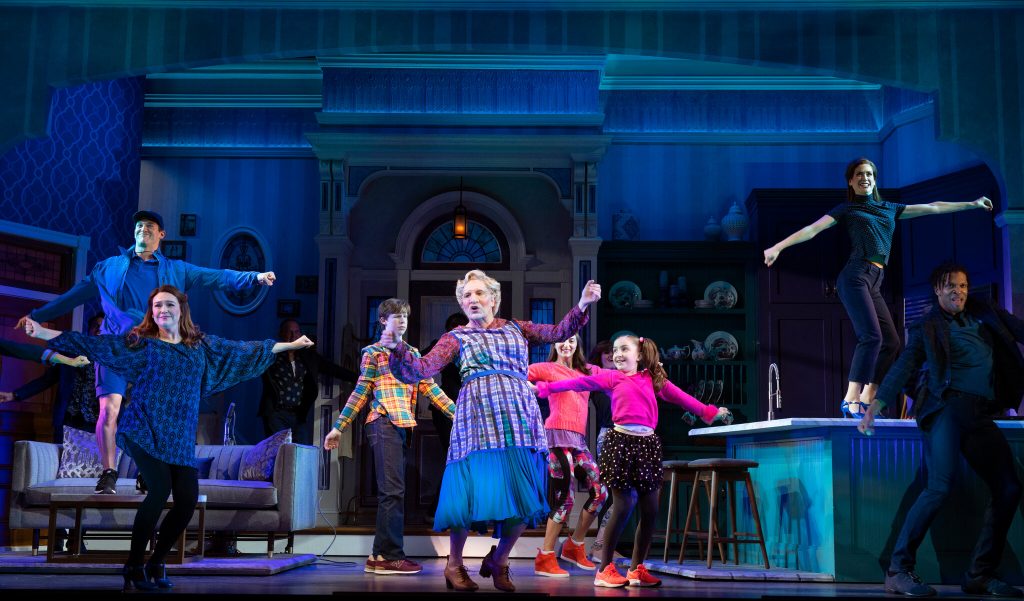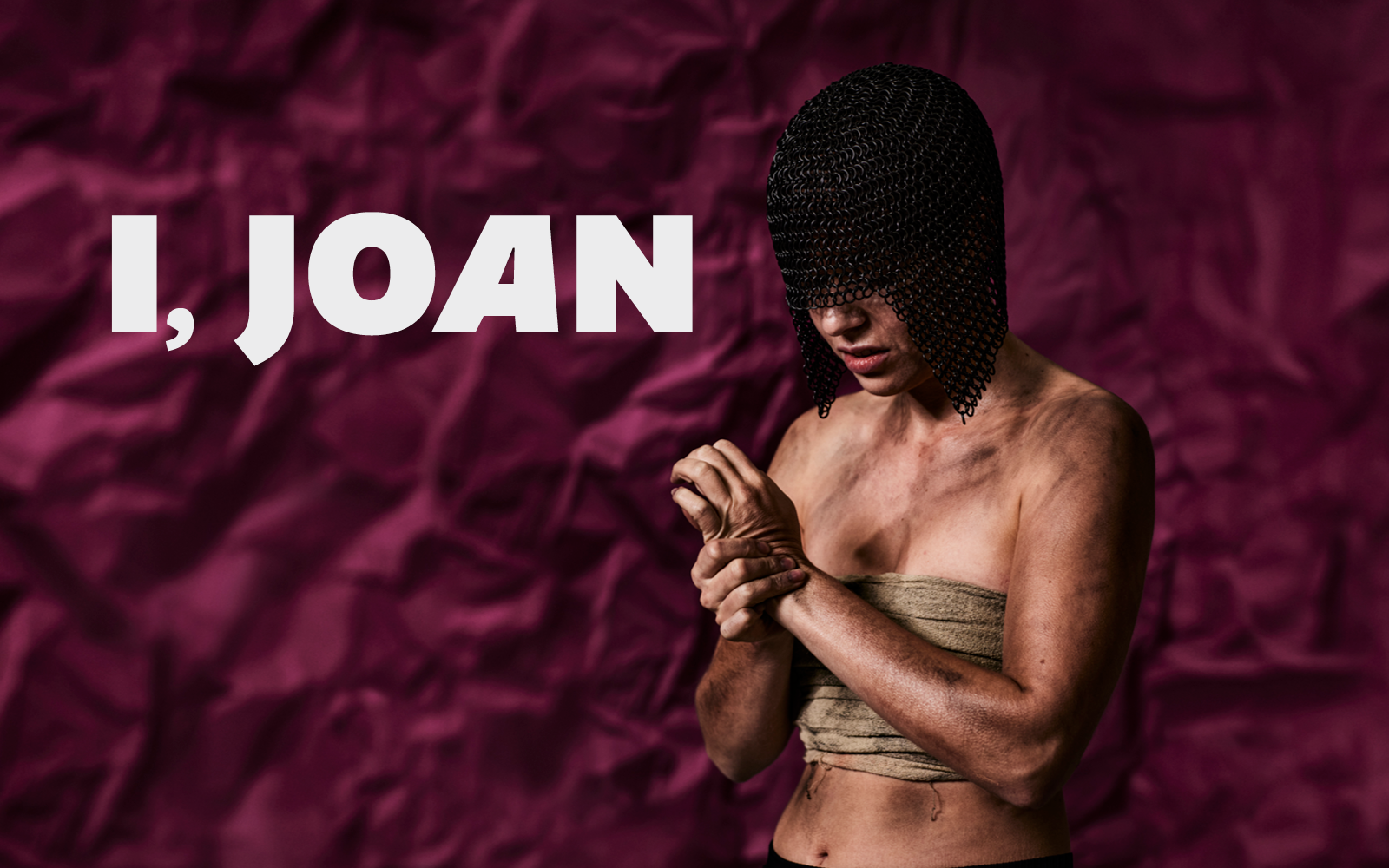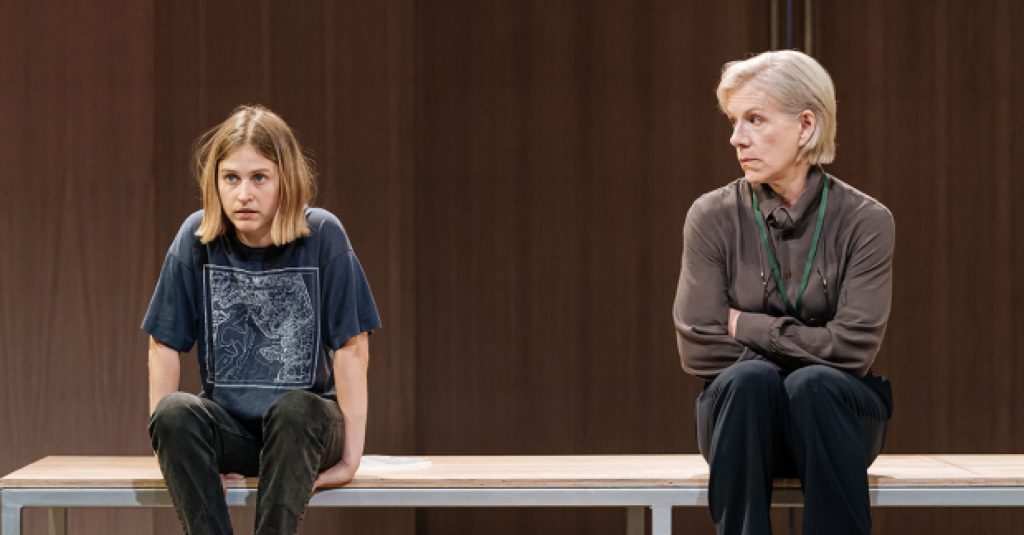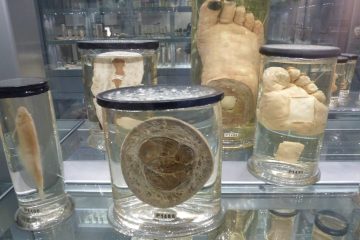
Eureka Day – The Old Vic
6 September – 31 October

Eureka Day, as seen in New York.
In a feat of timeliness somewhere between hugely coincidental and definitely deliberate, Helen Hunt stars in the London debut of the hit vaccine satire, Eureka Day. When mumps starts to spread through an idyllic California private school, the committee’s jab policy has them at each other’s throats before you can say “mandatory vaccination.”
Mrs Doubtfire – Manchester Opera House
2 September – 1 October

For those in need of something slightly less ‘of the moment,’ (or who live somewhere north of Islington), Manchester Opera House plays host to the comedy-musical based on the beloved Robin Williams flick, Mrs Doubtfire. Distraught at losing custody of his kids in a messy divorce, out-of-work actor Daniel creates a Scottish nanny alter-ego in an attempt to stay in their lives.
I, Joan – Globe Theatre
25 August – 22 October

Continuing its much-discussed debut at The Globe last month I, Joan reimagines the Arc-based protagonist as queer and non-binary. The final play to premiere in the Globe’s 2022 summer season, the theatre describes how “Rebelling against the world’s expectations, questioning the gender binary, Joan finds their power and their belief spreads like fire.”
Six – Bristol Hippodrome
20-24 September

The Fringe may be over this year, but one of the 2017 festival’s biggest surprise hits continues its way around the country this month with a 5-day stay in the Bristol Hippodrome. With five Olivier nominations and a Tony Award to its name, this musical take on Henry VIII’s famous exes is not one to miss.
The Doctor – Duke of York
29 September 2022 – 11 December 2022

For those in search of something a little more serious, Juliet Stevenson stars in 2019’s blistering drama set in a North London hospital. Based on Arthur Schnitzler’s banned 1912 play, Professor Bernhardi, The Doctor explores the ethical dilemma faced by a senior physician treating a young woman with sepsis following an abortion, when a priest arrives to deliver the last rites.
Willy Russell’s Blood Brothers – Leeds Grand Theatre
6-10 September

Northern-bound theatre lovers rejoice as Willy Russell’s legendary musical makes a brief appearance at the Leeds Grand. Centered around twin brothers, separated at birth and brought up on opposite sides of the tracks, their reunion throws the entire social structure of sixties Liverpool into question. With songs, of course.
The Two Popes – Rose Theatre Kingston
9-23 September

For those with fond memories of the 2020 Academy Awards comes the play that inspired the Oscar-nominated film, The Two Popes. When Pope Benedict XVI resigned in 2013, he became the first Pope in 700 years to do so. Anthony McCarten’s 2019 play explores just what drove the uber-conservative to make such a radical break from tradition, and stars Anton Lesser and Nicholas Woodeson as the titular heads of state.
A Different Stage – Various Venues
2 September – 15 November

And last, but by no means least, Gary Barlow takes his A Different Stage to… the stage this month. Created with long-time friend and collaborator Tim Firth, it sees the singer-songwriter narrate the journey of his life alongside the music from his incredible discography. You could say it’s a gig, yes, but screw it: it’s a theatrical experience and we’re putting it down in our Theatre guide.



1 Comment
Re: “I, Joan”: Historians have debunked many of the claims made by the playwright and by this article. Several eyewitnesses who were at Joan of Arc’s trial said she continued wearing soldier’s clothing in prison (the “male clothing” which supposedly makes her “non-binary”) so she could keep it “firmly laced and tied together” to prevent her guards from pulling her clothing off when they tried to rape her, since this type of clothing allowed the trousers, hip-boots and tunic to be laced together into a single piece. Medieval Catholic doctrinal sources state bluntly that this type of necessity-based cross-dressing was allowed since the motive wasn’t sinful, but the pro-English tribunal – whose members are documented as such in English government records – deliberately ignored this principle and then finally maneuvered her into a fake “relapse” (to justify a conviction) when the guards took away her dress and then forced her to put the soldier’s clothing back on, according to the trial bailiff, Jehan Massieu. She therefore didn’t “choose” this, as the playwright claims, and the trial transcript’s version was deliberately falsified on this issue (and many other issues) according to dozens of eyewitnesses since the trial was rigged by pro-English clergy. These were not representative of the Church as a whole, as this article implies, since many other clergy throughout Europe had officially supported her in many letters and other documents, including an official approval given in April 1429 by high-ranking clergy at Poitiers when Charles VII had her examined by the Inquisitor for Southern France and other theologians. This contradicts the article’s claim that the “Church” as a whole opposed her for allegedly “leading” an army and having visions; but her role in the army was quite a bit different than this article claims since she denied fighting or calling herself a commander, which is confirmed on both points by eyewitness accounts and Charles VII’s military records. She had much the same role as the many other female religious visionaries and mystics in that era (St. Catherine of Siena, St. Brigitta, St. Colette de Corbie, etc) who had all been accepted by the medieval clergy since such a role was not “heretical” unless combined with actual doctrinal heresy, which the theologians at Poitiers had decided was not the case in Joan’s circumstances. As for her gender identity, she consistently called herself “the maiden” (“la pucelle”) as her standard moniker, which would indicate a female identity beyond any reasonable doubt. Wearing soldier’s clothing for practical reasons does not make her non-binary.